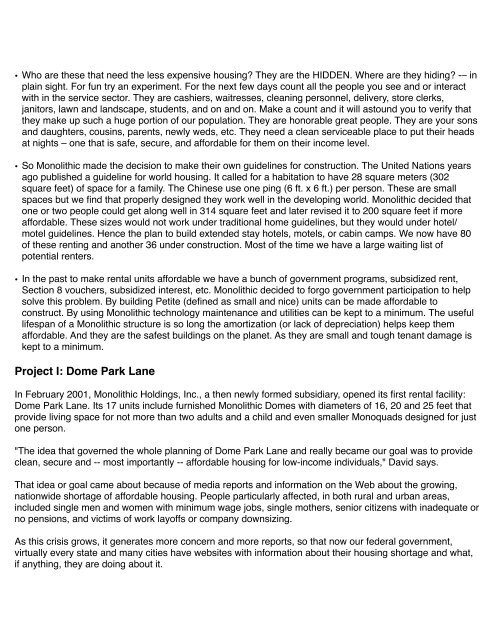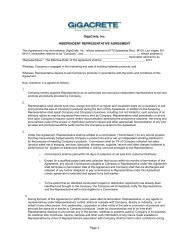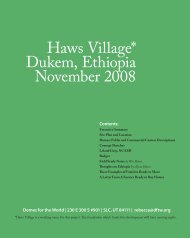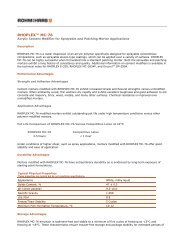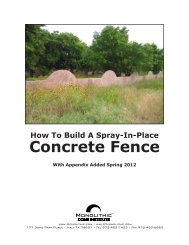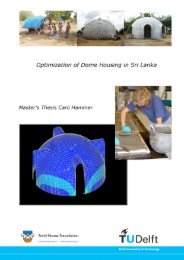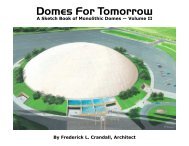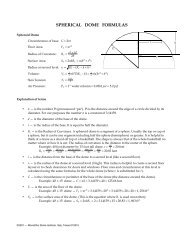Monolithic Cabin
Monolithic Cabin
Monolithic Cabin
You also want an ePaper? Increase the reach of your titles
YUMPU automatically turns print PDFs into web optimized ePapers that Google loves.
• Who are these that need the less expensive housing? They are the HIDDEN. Where are they hiding? -– in<br />
plain sight. For fun try an experiment. For the next few days count all the people you see and or interact<br />
with in the service sector. They are cashiers, waitresses, cleaning personnel, delivery, store clerks,<br />
janitors, lawn and landscape, students, and on and on. Make a count and it will astound you to verify that<br />
they make up such a huge portion of our population. They are honorable great people. They are your sons<br />
and daughters, cousins, parents, newly weds, etc. They need a clean serviceable place to put their heads<br />
at nights – one that is safe, secure, and affordable for them on their income level.<br />
• So <strong>Monolithic</strong> made the decision to make their own guidelines for construction. The United Nations years<br />
ago published a guideline for world housing. It called for a habitation to have 28 square meters (302<br />
square feet) of space for a family. The Chinese use one ping (6 ft. x 6 ft.) per person. These are small<br />
spaces but we find that properly designed they work well in the developing world. <strong>Monolithic</strong> decided that<br />
one or two people could get along well in 314 square feet and later revised it to 200 square feet if more<br />
affordable. These sizes would not work under traditional home guidelines, but they would under hotel/<br />
motel guidelines. Hence the plan to build extended stay hotels, motels, or cabin camps. We now have 80<br />
of these renting and another 36 under construction. Most of the time we have a large waiting list of<br />
potential renters.<br />
• In the past to make rental units affordable we have a bunch of government programs, subsidized rent,<br />
Section 8 vouchers, subsidized interest, etc. <strong>Monolithic</strong> decided to forgo government participation to help<br />
solve this problem. By building Petite (defined as small and nice) units can be made affordable to<br />
construct. By using <strong>Monolithic</strong> technology maintenance and utilities can be kept to a minimum. The useful<br />
lifespan of a <strong>Monolithic</strong> structure is so long the amortization (or lack of depreciation) helps keep them<br />
affordable. And they are the safest buildings on the planet. As they are small and tough tenant damage is<br />
kept to a minimum.<br />
Project I: Dome Park Lane<br />
In February 2001, <strong>Monolithic</strong> Holdings, Inc., a then newly formed subsidiary, opened its first rental facility:<br />
Dome Park Lane. Its 17 units include furnished <strong>Monolithic</strong> Domes with diameters of 16, 20 and 25 feet that<br />
provide living space for not more than two adults and a child and even smaller Monoquads designed for just<br />
one person.<br />
"The idea that governed the whole planning of Dome Park Lane and really became our goal was to provide<br />
clean, secure and -- most importantly -- affordable housing for low-income individuals," David says.<br />
That idea or goal came about because of media reports and information on the Web about the growing,<br />
nationwide shortage of affordable housing. People particularly affected, in both rural and urban areas,<br />
included single men and women with minimum wage jobs, single mothers, senior citizens with inadequate or<br />
no pensions, and victims of work layoffs or company downsizing.<br />
! !<br />
As this crisis grows, it generates more concern and more reports, so that now our federal government,<br />
virtually every state and many cities have websites with information about their housing shortage and what,<br />
if anything, they are doing about it.


